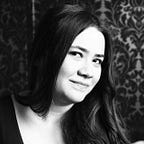These women are challenging Mongolia’s gender norms with comic books
It’s the country’s first series of feminist comics
Visiting museums while growing up, Zolzoya Bakthuyag, a 34-year-old lawyer, always wondered why the places that depicted the history of her country always exhibited men’s photos and paintings so prominently.
“Mongolian women played a great role building the country too, but museums only hang men’s photos. It was confusing,” she said, sitting in her office in a high-rise building huddled by snow-peaked green hills in the Mongolian capital Ulaanbaatar.
Mongolia has the highest levels of gender equality in East Asia. In global rankings, the vast and sparsely populated country sits in the 52nd place. The United States ranks 43 out of 188 surveyed countries, even though Mongolia is 15 times poorer than the United States.
Mongolian women are healthier and wealthier than ever. Yet, pressing issues like widespread domestic violence, the gender pay gap and lack of political participation linger.
The pictures that Bakthuyag saw in the museum as a child were far from the only thing that baffled her about the gender issues she observed in her society. As she grew older, she witnessed her friends being beaten by their partners and suffering from stereotypes at work. She heard police blaming femicide victims and read about the clothes of female politicians in tabloid newspapers. She observed her LGBT friends, especially those from lower social classes, being bullied in every walk of life.
“A lot of women think we have achieved gender equality in Mongolia,” she said, “Yet, 67 percent of the police calls are due to domestic violence.”
Bakthuyag started her own nonprofit, Women For Change Mongolia, with three other women lawyers.
“We wanted to communicate the everyday issues women [face] in the simplest, yet most engaging and striking way possible,” Bakthuyag said.
They decided to create a series of comic books to communicate these issues to what Bakthuyag describes as the “average Mongolian woman who might not even know what feminism means.”
Their first issue was related to women’s political participation — or lack thereof — tied to the upcoming elections.
After sessions of brainstorming, three main characters for the comic book emerged: Ms. Candidate, Ms. Curiosity and Ms. Solution.
Bakthuyag and her colleagues collaboratively wrote the stories, often using their own life experiences as a source of inspiration. Narantulga Buriad, their graphic designer, made sure to represent disability, different age groups and genders in her drawings.
When the three characters are visiting the Mongolian National History Museum, Ms. Curiosity ponders, “How come all these leaders were men?”
The book follows the political campaign of Ms. Candidate, as she wrestles negative stereotypes and gets called “too stubborn” when she is determined about an issue.
In the end, the story has a happy ending: Ms. Candidate’s political campaign is successful and she joins the Mongolian Parliament.
In real life, the success of Ms. Candidate would be a rarity. Women hold 16 percent of the seats in the Parliament — an increase from 4 percent in 2009 — but a steep dropoff the 25 percent the country saw under the communist government.
Bakthuyag and her colleagues got a positive response to the first issue, so they decided to work immediately on the second book, focusing on domestic violence — which they say is one of the worst gender-related issues in Mongolia.
“Violence is very stigmatized and even the very word violence itself is a taboo,” said Anudari Ayush, 29, one of the other co-founders of Women For Change Mongolia, who worked on the second comic book.
“In Mongolian culture, family is considered to be sacred,” she explained. “We have a saying, ‘If the head is broken, you should hide it in the hat.’”
“Because of this [when there’s a case of domestic violence] not even the neighbors respond to it. Police often don’t even answer the calls.”
Like in many countries in the world, domestic violence has loose definitions and comes with a tricky law enforcement process in Mongolia.
The comic book about domestic violence opens with Ms. Curiosity and Ms. Solution watching television while a presenter breaks the news about the draft law proposing to criminalize domestic violence.
“Isn’t domestic violence a domestic issue?” Ms. Curiosity, who is cynical about the new law, asks. Throughout the book, she comes to the conclusion that violence is never justified.
Ayush feels that this book, in combination with other civil society efforts, has helped to challenge the way many people perceive domestic violence.
To help change existing perceptions, the group distributed the comic books to police units dealing with domestic violence and were surprised with the results.
“They called us and asked us to train them about these issues. We gave workshops to the police stations about the realities of domestic violence and how to deal with it,” Ayush added. “We were very moved when they said they wanted to learn from us. Hopefully they will get back to more calls now and things will start to change.”
Following the success of the first feminist comic books of Mongolia, Bakthuyag and her colleagues have no plans to slow down. The third book is already on the way and it will be published in February 2018, just in time for the Valentine’s Day.
“It will be titled ‘How to Have Great Sex’, fitting with the month’s theme,” Bakthuyag explained.
“If we named it ‘How to have safe and consensual sex and pleasure your partner and yourself while knowing your reproductive rights’ it would be just too long.”
